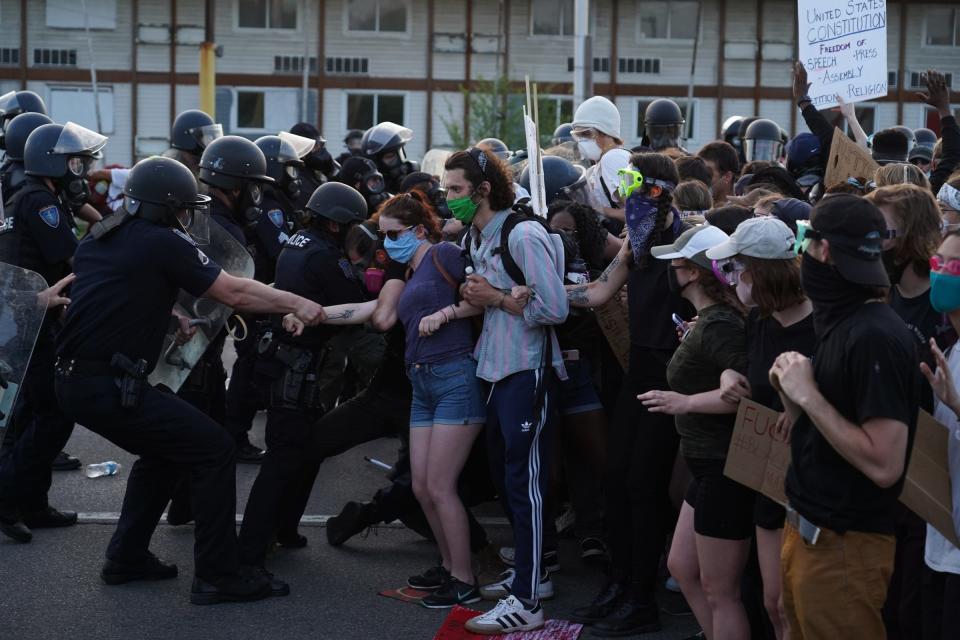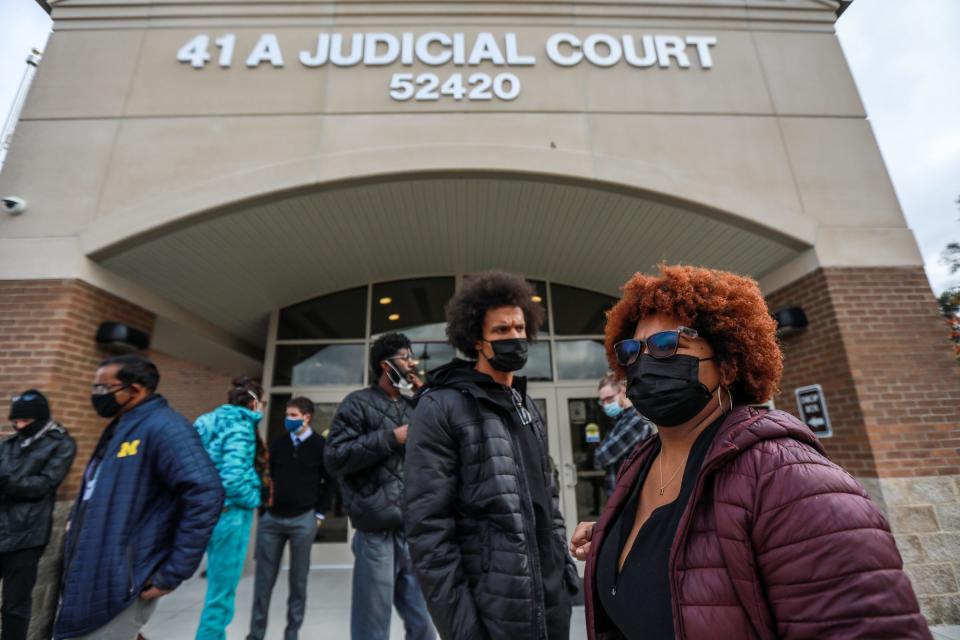Detroit was never going to admit it overstepped in Detroit Will Breathe charges | Opinion
This is how the City of Detroit's ill-considered three-year prosecution of the leaders of the 2020 George Floyd protests is going:
Tristan Taylor and Nakia Wallace, co-founders of the activist group Detroit Will Breathe, pleaded no contest to the low-level misdemeanor of loitering, receiving delayed sentences. A no contest plea settles a case without an admission of guilt, and the delayed sentences mean that by spring, the charges will be dismissed.
A judge dismissed misdemeanor charges this spring against two more Detroit Will Breathe protesters, Bryan Silverstein and Lloyd Simpson, ruling that after 33 months, the city had violated the activists' right to a speedy trial. The city appealed the dismissals, an extremely unusual course of action — in 2021, 6,345 non-traffic misdemeanors were dismissed by judges in Detroit's 36th District Court, according to state records; in all of Wayne County, just 61 misdemeanor dismissals were appealed that year.
This resource-strapped city has dedicated significant resources to a thus-far fruitless effort to win convictions against these activists.
Why?
Detroit officials have declined repeated requests to explain the city's legal strategy, but the disposition of Taylor's and Wallace's cases — and its determination to reinstate the charges against Silverstein and Simpson — offers one interpretation. As part of the plea deals, a city attorney explained in a hearing earlier this month, Wallace (and Taylor, a month before) agreed not to sue the city.

Again, that is. In 2021, Detroit Will Breathe won a judgment against the city of Detroit in a civil lawsuit over brutal tactics used by police during the 2020 protests.
Regardless of the city's motives, it is time to stop.
Two city task forces?
After George Floyd was murdered in May 2020 by Minneapolis police, Wallace, Taylor and others formed Detroit Will Breathe, leading more than 100 consecutive nights of largely peaceful protests.
The tactics police employed to break up the protests underscored the case for reform: Video from the protests showed cops lobbing canisters of tear gas and blasting activists, sometimes already handcuffed, with pepper spray, aggressively taking down protesters and making seemingly indiscriminate mass arrests. Police body camera footage shows officers excitedly discussing the harsh treatment they had administered.
Hundreds of activists were charged that summer, mostly with misdemeanors like violating curfew or disorderly conduct. But by February 2021, charges against almost all of the activists, barring Taylor, had been dismissed by judges or at the city's request, largely for lack of evidence.
That should have been the end of it.

Months before, the city had begun to review video footage from the protests, looking for grounds for new charges.
A different city task force, working at the same time, reviewed the same footage of the same protests, seeking evidence for the city's defense in Detroit Will Breathe's civil suit.
But these were two separate operations, testified Lawrence Garcia this spring. The head of Detroit's law department in 2020 suggested that it was simply a coincidence that the first task force turned up supposedly incriminating footage only of Detroit Will Breathe leaders or plaintiffs in the civil suit, while the second task force seems not to have provided material to refute the plaintiffs' civil claims.
When the last charges against activists had been dismissed, the city sent out a news release. Few took notice when the law department refiled charges against Wallace, Simpson and Silverstein two months later.
Before accepting the plea deal, Wallace's attorney had argued in court that the city's continued prosecution of her client was vindictive, that Wallace was being targeted because she led the protests and was a plaintiff in the successful civil suit. The plea deal preempted a judge's ruling on that contention.
More: Detroit's old Chinatown building demolished despite calls to consider preservation
More: Where is Jimmy Hoffa? A look at searches in Michigan
It's worth noting that without the threat of prosecution, neither Silverstein nor Simpson has an incentive to release the city from legal liability.
"When the city's decision to appeal Mr. Simpson's case is viewed in conjunction with the extremely low rate of misdemeanor appeals as well as the city's decision to otherwise make plea offers contingent on defendants willingness to waive their right to sue the city or individual officers, the city's goal appears to be shielding itself from liability,” said Simpson's attorney, Allison Kriger of LaRene and Kriger PLC.
"Essentially, it suggests there is conflict of interest here. In prosecuting these cases, they can't focus on the traditional prosecutorial role, which is to make sure justice is done.”
Why plead?
Taylor became active in the 2020 protests because he didn't have faith in the criminal justice system. The last three years haven't changed that.
"There's something really troubling about police being able to use force to police those protesting to criticize them," he told me earlier this month.
Pleading guilty was not an option, Taylor said: "We didn’t want the city to be able to set a precedent for legal repercussions for people who are standing up against the police. Even our deal was ensuring we didn’t have to plead guilty. We didn’t want the city to set that precedent, and we are concerned that they did attempt to do that."
But he was willing to plead no contest.
None of the four activists the city has so intently pursued had prior criminal records. Pleading guilty to even a misdemeanor is life-changing, limiting a person's ability to find work or housing.
"We don’t think, quite frankly, that real justice can be had through the courts or through capitalism," Taylor said. "Sure, the city paid us (after it lost the civil suit), but every single police officer that committed brutality against protesters still has their job. That’s why we settled. The fight against the police, for real justice, is going to happen on the streets, not in the courts."
Absolving the city of civil liability for how it managed these prosecutions — well, Taylor said it's about what he'd expect.
"That, to me, speaks volumes about what the plea deal was about, and why the city was so aggressive in going after Nakia and myself and other protesters," he said.
'The city should be embarrassed'
Nancy A. Parker of the Detroit Justice Center, a member organization of the Detroit Coordinated Defense, who represented Wallace, says she's pleased the case has finally been resolved. But, she said, it shouldn't have come to this.
"This was purely vindictive on the part of the city, and a complete waste of resources: Money, time, labor, every staff person who was dragged into this because the city refused to concede a battle it had already lost is a poor reflection on the city," Parker said. "The city should be embarrassed. After a federal judgment that lambasted them for all the constitutional violations it inflicted on non-violent protesters, you go to these lengths to prove what point?"
That's part of what rankles, said Matthew Dupree, who is representing Silverstein. Dupree has served as house counsel — a public defender— in 36th District Court for eight years.
"I tried an armed robbery case Wednesday in which the Detroit Police Department had not taken fingerprints at the crime scene, despite being at the crime scene," Dupree said. "The DPD does not have the resources to do basic investigation on a gun crime — armed robbery — but it has the resources to pursue these cases for three years? ... Of all of the things they could be focusing those resources on, it’s this?"
The sound of silence
The city can't say how much it is spending on these prosecutions — a spokesman says the Law Department doesn't track costs that way — but I can spitball it for you: Too much.
"These young people are part of an organization where folks were not only demanding accountability, but good use of resources. We're dealing with an eviction problem here, people need houses, people need jobs, people need services," Parker said. "Instead of attending to those real problems, the city had no qualms wasting hard-earned taxpayer money on these frivolous charges."
Thousands of metro Detroiters protested that summer. More sat on the sidelines, some outright hostile to the activists' cause, some reluctant to endorse the movement's most uncompromising positions.
It doesn't matter.
Whether you believe that police ought to be reformed or defunded or abolished or left intact, the constitutionally protected right to demand government redress of grievances is at the heart of what it means to be an American.
Detroit's persistent silence about the protests it attempted to quell, and the activists it continues to pursue, speaks volumes.
Nancy Kaffer is the editorial page editor of the Detroit Free Press. Contact: nkaffer@freepress.com. Submit a letter to the editor at freep.com/letters. Become a subscriber at Freep.com.
This article originally appeared on Detroit Free Press: Opinion: Detroit never going to admit it is wrong on protest charges

